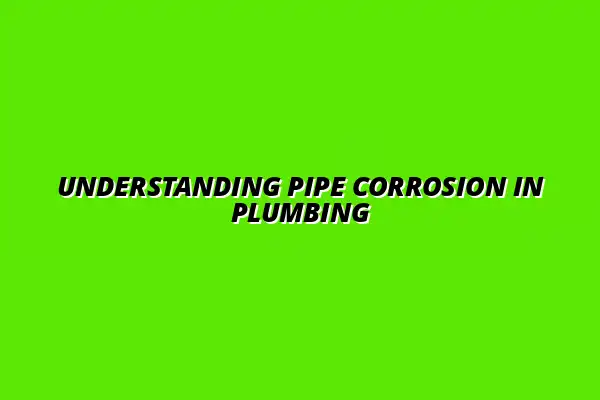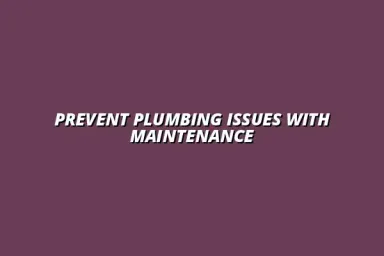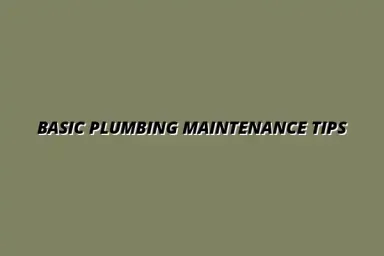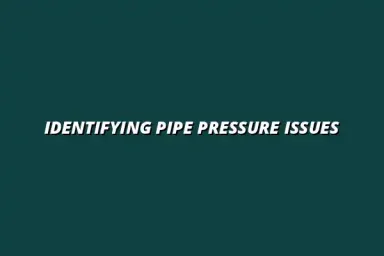The Importance of Understanding Pipe Corrosion in Plumbing Systems
Understanding pipe corrosion is essential for maintaining a healthy plumbing system. It occurs when materials degrade due to chemical reactions, environmental factors, and more. If left unchecked, corrosion can lead to serious plumbing issues and costly repairs!
Not only does it affect the lifespan of your plumbing, but it can also compromise water quality. By recognizing the signs and causes of corrosion, homeowners can take proactive steps to protect their plumbing systems. Let's dive deeper into this topic!
Defining Pipe Corrosion: What Is It?
Pipe corrosion is the gradual deterioration of plumbing pipes caused by various factors. It can take different forms, leading to significant damage if not addressed. Understanding the basics can help homeowners make informed decisions about their plumbing maintenance.
Corrosion can affect many types of pipes, including those made from metal, plastic, and other materials. Each type has its own vulnerabilities, making it crucial to recognize what specific issues may arise. For example, learning how to prevent pipe corrosion at home is a crucial step in maintaining your kitchen plumbing. Below are some common types of corrosion affecting plumbing pipes:
- Uniform Corrosion: This type occurs evenly across the surface of the pipe, often due to environmental exposure.
- Pitting Corrosion: This leads to small holes or pits forming, which can weaken the structural integrity of the pipe.
- Galvanic Corrosion: This happens when two different metals come into contact in the presence of moisture, leading to accelerated deterioration.
Types of Corrosion Affecting Plumbing Pipes
When it comes to plumbing, understanding the various types of corrosion is crucial. Each type can have different causes and effects on your plumbing system. Here’s a closer look:
- Crest Corrosion: Occurs at the edges or crests of the pipe.
- Crevice Corrosion: Happens in confined spaces where moisture can accumulate.
- Stress Corrosion Cracking: A combination of corrosion and mechanical stress, leading to cracks.
By identifying these types, homeowners can address specific issues and implement targeted solutions. For preventative measures in your bathroom, check out these tips to prevent bathroom plumbing corrosion. Awareness is the first step toward prevention!
The Chemical and Physical Processes Behind Corrosion
Corrosion is driven by both chemical and physical processes that alter the structure of pipes. The most common causes include exposure to moisture, oxygen, and various chemicals. These elements can lead to reactions that corrode metal and weaken pipes over time.
In particular, the interaction between water and metal is a key factor. Oxidation is the primary chemical reaction that breaks down the metal, while factors like temperature and pH levels can accelerate the process. Understanding these processes can help in identifying preventive measures!
Why Pipe Corrosion Is a Critical Concern for Homeowners
Pipe corrosion is a significant concern for homeowners for several reasons. It can compromise the integrity of plumbing systems, leading to leaks and other failures. Furthermore, understanding its impact can save you money and hassle down the line!
Recognizing the signs of corrosion early can help prevent catastrophic plumbing issues that might disrupt your daily life. For homeowners, being aware of these implications is vital for effective maintenance and repair. Regular maintenance, as described in this guide to essential plumbing maintenance for homes, is key.
Impact on Plumbing System Integrity and Longevity
The integrity of your plumbing system is heavily influenced by pipe corrosion. When pipes corrode, they weaken, leading to potential failures. This can not only disrupt your water supply but also lead to costly repairs!
Here are some impacts corrosion has on plumbing systems:
- Reduced water pressure due to blockages from corrosion.
- Increased risk of leaks leading to water damage.
- Shortened lifespan of plumbing fixtures and appliances.
Connection Between Corrosion and Plumbing Failures
The connection between corrosion and plumbing failures is clear. As pipes corrode, they become more susceptible to cracking and breaking. This can lead to sudden leaks, flooding, and significant damage to your home!
Understanding this connection is essential for homeowners. Regular inspections and maintenance can help identify problems before they escalate. If you're dealing with rusty pipes, learn how to repairing rusty metal water pipes effectively. Here’s a quick list of preventative measures to consider:
- Schedule routine plumbing inspections.
- Monitor water quality and pressure.
- Use protective coatings on pipes to prevent corrosion.
Assessing the Impact of Pipe Corrosion on Plumbing Failures
Understanding how pipe corrosion affects plumbing failures is crucial for homeowners. When pipes corrode, they weaken over time, leading to leaks and potentially severe water damage. Recognizing this relationship helps you take preventive measures to protect your plumbing system.
Corroded pipes can create a domino effect of problems, often culminating in significant repair costs. As we dive deeper into how corrosion contributes to leaks, it's essential to be aware of the signs and seek timely solutions to maintain the integrity of your plumbing. For example, preventing corrosion in water heater pipes is a critical aspect of overall plumbing maintenance.
Understanding the Relationship Between Corrosion and Leak Formation
Corrosion can significantly increase the likelihood of leaks in plumbing systems. When the pipe material deteriorates, it creates weak spots that are prone to breaking. Eventually, these weaknesses can lead to leaks, which can escalate into more severe issues such as mold growth and structural damage.
Often, homeowners might notice increased water bills or damp spots on walls and floors, which are clear indicators of leaks caused by corrosion. Addressing these leaks promptly can help mitigate extensive water damage and reduce overall repair costs.
- Increased water pressure: This can exacerbate the effects of corrosion.
- Old or damaged pipes: Aging materials are more susceptible to corrosion.
- Environmental factors: Soil chemistry and temperature fluctuations can accelerate the corrosion process.
How Corroded Pipes Lead to Leaks and Water Damage
When pipes corrode, they lose their structural integrity, which can lead to leaks forming in various places. These leaks can be tiny at first, but they can grow over time, leading to significant water damage. Homeowners often overlook these minor leaks until they become a more considerable issue, highlighting the importance of regular inspections.
Moreover, leaks can create a perfect environment for mold and mildew, which poses additional health risks. Keeping an eye on your plumbing's condition can save you from costly repairs and health hazards down the line.
The Economic Costs Associated with Plumbing Failures Due to Corrosion
The economic implications of plumbing failures due to corrosion can be staggering. Homeowners can face expenses related to both the immediate repair of leaks and the long-term damage caused by water exposure. These costs can include:
- Repairing or replacing corroded pipes.
- Water damage restoration services.
- Increased water bills due to undetected leaks.
- Potentially higher insurance premiums if extensive damage occurs.
Being proactive in addressing corrosion can help prevent these expenses and ensure a healthier home environment. It's important to factor in these potential costs when considering the upkeep of your plumbing system. Sometimes, proactive measures such as preventing tree roots from damaging your pipes can save immense costs down the line. Check out this guide on preventing tree root damage.
Case Studies of Plumbing Failures Attributed to Pipe Corrosion
Real-world examples highlight how pipe corrosion can lead to plumbing failures. In one case, a homeowner experienced severe water damage after a copper pipe corroded and burst during a winter freeze. This incident resulted in costly repairs and significant disruption to their daily life.
Another case involved an older apartment building, where multiple tenants reported leaks due to corroded cast iron pipes. This prompted a complete overhaul of the plumbing system, underscoring how corrosion can affect entire structures, not just individual homes. For assistance with your plumbing needs in Billesley, Birmingham, consider contacting a local plumber.
Real-World Examples of Plumbing Failures and Their Causes
These real-life situations reveal the serious consequences of neglecting pipe corrosion. Many plumbing issues stem from materials that were unsuitable for the environmental conditions they faced. Here are a few common scenarios:
- Homes with copper piping in acidic water areas experienced accelerated corrosion.
- Older homes with galvanized pipes saw rust and corrosion leading to leaks.
- Commercial buildings with improper drainage systems faced pipe failures during heavy rains.
Each of these examples teaches valuable lessons on the necessity of choosing appropriate materials and maintaining plumbing systems diligently.
Lessons Learned from Plumbing Disasters Related to Corrosion
From these cases, we can gather critical insights about avoiding similar plumbing disasters. Regular inspections can uncover early signs of corrosion, allowing for timely repairs before a small issue becomes a significant disaster. Additionally, understanding the implications of the water quality on pipe materials can help homeowners make informed decisions.
These lessons emphasize the importance of proactive measures, as the cost of prevention is often much lower than the cost of repair after a failure occurs. Keeping an eye on your plumbing can save both hassle and money!
Best Practices for Mitigating Plumbing Failures Caused by Corrosion
To avoid the damaging effects of pipe corrosion, it’s essential to establish best practices for plumbing maintenance. Regular inspections and monitoring can help catch issues before they escalate. This involves checking for signs of corrosion and ensuring that all plumbing components are in good condition.
Creating a schedule for plumbing checks can also be beneficial. For example, I like to inspect my plumbing system at least twice a year, focusing on:
- Looking for discoloration or rust on pipes.
- Listening for unusual sounds from pipes that might indicate leaks.
- Checking water pressure levels to avoid undue stress on the system.
Regular Inspection and Monitoring Techniques
Establishing a routine for inspecting your plumbing system is a smart way to mitigate corrosion risks. Some effective techniques include:
- Using a moisture meter to measure humidity levels near pipes.
- Installing a water softener to reduce mineral deposits that can lead to corrosion.
- Keeping an eye on your water quality and considering regular water testing.
These monitoring techniques can help you identify potential issues before they become major problems, keeping your plumbing system healthy and functional.
Emergency Preparedness for Plumbing Failures
No matter how diligent you are, emergencies can still happen. Being prepared for plumbing failures is vital. This includes having emergency contacts readily available, knowing how to shut off the water supply, and having basic tools on hand for quick fixes.
Creating a plumbing emergency kit can be a lifesaver! I recommend including:
- Adjustable wrenches for pipe repairs.
- Repair tape for quick leak fixes.
- Flashlights and batteries in case of water-related power outages.
Being prepared can make a stressful situation much easier to manage!
Long-Term Solutions for Preventing Corrosion in Plumbing Systems
Addressing corrosion in plumbing systems requires long-term strategies. It's not just about fixing leaks as they arise, but also about implementing solutions that prevent corrosion from happening in the first place. One innovative approach is using anti-corrosion coatings, which can extend the life of pipes significantly.
Many plumbing professionals are now recommending advanced materials that offer better resistance to corrosion. This proactive approach can save homeowners from the hassle of dealing with plumbing failures later on.
Innovative Technologies for Anti-Corrosion in Plumbing
There are some exciting technologies emerging to combat pipe corrosion. These include:
- Polymer-based coatings that prevent rust.
- Smart sensors that monitor pipe conditions in real-time.
- Advanced materials like PEX and PVC, which are less susceptible to corrosion.
These innovations offer homeowners an array of options to consider when upgrading their plumbing systems!
The Role of Water Treatment in Reducing Corrosion Risks
Water treatment plays a vital role in preventing corrosion in plumbing systems. By managing water chemistry, homeowners can reduce the risk of corrosion-related issues significantly. Simple treatments can help lower acidity levels and minimize mineral deposits.
Some effective water treatment methods include:
- Installing water softeners to reduce hard minerals.
- Using acid neutralizers to balance pH levels in water.
- Regularly testing water quality to ensure safe and clean usage.
Implementing these treatments can lead to a healthier plumbing system and a more comfortable home environment!
Holistic View on Maintaining Plumbing Systems to Reduce Corrosion Risks
Adopting a holistic view on plumbing maintenance can greatly reduce corrosion risks. It’s not just about fixing what’s broken; it’s about establishing a routine that keeps your entire plumbing system in optimal condition. Regular maintenance checks, thoughtful upgrades, and timely repairs form the foundation of effective plumbing care.
Integrating a comprehensive approach can help you identify issues early and ensure that your plumbing system is functioning correctly. This proactive mindset can save you from costly repairs and major headaches!
Integrating Regular Maintenance and Upgrades
To maintain your plumbing system effectively, consider integrating regular maintenance and timely upgrades. This means planning for inspections, replacing outdated materials, and staying informed on new technologies. Here’s a simple plan to follow:
- Schedule annual plumbing inspections.
- Upgrade to corrosion-resistant materials when replacing pipes.
- Stay informed about plumbing technology advancements to enhance your system.
By taking these steps, you can ensure that your plumbing stays in excellent condition for years to come!
Engaging Professionals for Comprehensive Plumbing Health Checks
Sometimes, it’s best to leave things to the experts! Engaging plumbing professionals for comprehensive health checks can provide peace of mind. They have the expertise to identify potential issues that may go unnoticed by homeowners.
When hiring a professional, look for someone who offers:
- Thorough inspections of the entire plumbing system.
- Expert recommendations on repairs and upgrades.
- Access to advanced technologies for monitoring and maintenance.
Partnering with professionals ensures your plumbing system remains resilient against corrosion and other challenges!
Final Thoughts on the Role of Pipe Corrosion in Plumbing Integrity
In summary, understanding the impact of pipe corrosion on plumbing integrity is vital for every homeowner. By recognizing the signs, causes, and preventative measures, you can take proactive steps to protect your plumbing system. Maintaining your pipes not only enhances their lifespan but also ensures a safe and healthy living environment.
Encouragingly, there are numerous strategies and technologies available today to combat corrosion. By staying informed and engaged with your plumbing system, you can avoid costly failures and enjoy a worry-free home!

 Kiran Almasi
Kiran Almasi

